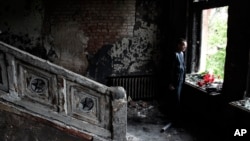A top Ukrainian Interior Ministry official said Monday that 32 pro-Russian protesters who perished in the Odessa trade union building that burned down during violence in the southern Ukrainian port city earlier this month may have been poisoned with chloroform.
Deputy Interior Minister Vitaliy Sakal, the ministry's chief investigator, said Monday that an investigative team had discovered chloroform in the burnt-out building.
Citing experts, Sakal said inhaling chloroform vapor obstructs breathing and that this was "what happened in our case." He said 32 victims died of suffocation and heart failure due to an "unidentified substance," not from the high temperature caused by the fire. He said the chloroform had been in the union building for several days.
A total of 48 people were killed in Odessa on May 2 when violence between pro-Russian activists and supporters of Ukrainian unity culminated in the fire in the Trade Unions Building. Along with the 32 people who died inside the building, 10 died jumping out of the building's windows, and six were shot to death in street fighting.
Sakal said both sides in the May 2 melee hurled Molotov cocktails.
He said investigators are considering four possibilities: that the deaths were the result of an order to "extremist groups" to destabilize Ukraine; illegal activity by local security bodies aimed at discrediting the Kyiv government; "uncontrolled actions" by pro-Ukrainian soccer fans and pro-Russian groups; or a "provocation" by "radically-minded persons."
Sakal said 12 people have been arrested in connection with the incident and 22 are suspected of involvement.
Russian Foreign Minister Sergei Lavrov, for his part, accused the Ukrainian authorities Monday of trying to "hide the truth" about the Odessa violence.
He said he wanted see an investigation into reports that about 1,000 "militants" arrived in Odessa on the eve of the incident, including "suspected mercenaries from other countries" who were paid by "well-known characters."
Lavrov said he also wanted investigators to probe reports that "the people died not from carbon monoxide, but from toxic chemicals and bullet wounds," and that many victims were killed after escaping the burning building.
The Russian foreign minister said he asked the United Nations and Organization for Security and Cooperation in Europe to ensure that the investigation of the events in Odessa is conducted "in a transparent manner, under the auspices of international organizations."
Deputy Interior Minister Vitaliy Sakal, the ministry's chief investigator, said Monday that an investigative team had discovered chloroform in the burnt-out building.
Citing experts, Sakal said inhaling chloroform vapor obstructs breathing and that this was "what happened in our case." He said 32 victims died of suffocation and heart failure due to an "unidentified substance," not from the high temperature caused by the fire. He said the chloroform had been in the union building for several days.
A total of 48 people were killed in Odessa on May 2 when violence between pro-Russian activists and supporters of Ukrainian unity culminated in the fire in the Trade Unions Building. Along with the 32 people who died inside the building, 10 died jumping out of the building's windows, and six were shot to death in street fighting.
Sakal said both sides in the May 2 melee hurled Molotov cocktails.
He said investigators are considering four possibilities: that the deaths were the result of an order to "extremist groups" to destabilize Ukraine; illegal activity by local security bodies aimed at discrediting the Kyiv government; "uncontrolled actions" by pro-Ukrainian soccer fans and pro-Russian groups; or a "provocation" by "radically-minded persons."
Sakal said 12 people have been arrested in connection with the incident and 22 are suspected of involvement.
Russian Foreign Minister Sergei Lavrov, for his part, accused the Ukrainian authorities Monday of trying to "hide the truth" about the Odessa violence.
He said he wanted see an investigation into reports that about 1,000 "militants" arrived in Odessa on the eve of the incident, including "suspected mercenaries from other countries" who were paid by "well-known characters."
Lavrov said he also wanted investigators to probe reports that "the people died not from carbon monoxide, but from toxic chemicals and bullet wounds," and that many victims were killed after escaping the burning building.
The Russian foreign minister said he asked the United Nations and Organization for Security and Cooperation in Europe to ensure that the investigation of the events in Odessa is conducted "in a transparent manner, under the auspices of international organizations."








